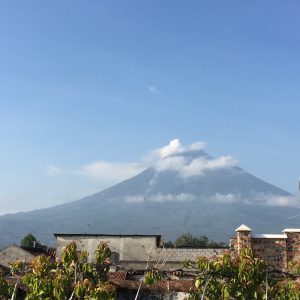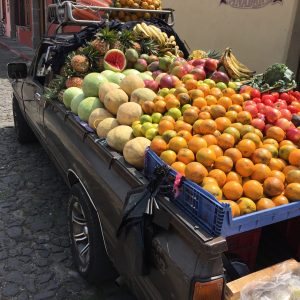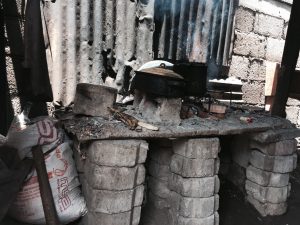
Antigua
Wednesday morning. The coffee splashes from my cup across the table and onto the floor. Embarrassed gestures summon the hotel desk clerk to help me clear up the mess. The emotional din in my head is not so easily sorted. My embarrassment of riches never fades from view. Our modest hotel is not so humble in contrast to the colonnade of homeless in Parque Central at night.
A dormant volcano south of Antigua.[/caption]This is Antigua, a cauldron of contrasts in the shadow of volcanoes – one dormant and the other intermittently belching smoke and ash. Dogs—young, old, well fed, and malnourished are ubiquitous. Tires rumble over old cobblestoned streets trailed by noxious fumes. Women and children eke out a living hawking jewelry, trinkets and cigarettes. Well past 10 p.m. we pass two women and three children who have set up a sidewalk bodega of trinkets and sweets. A five-year old vendor, and his mother, are both nodding off even as the group offers us the goods. The thump of music from the bar three doors away can’t cut through their need to sleep.
Words don’t flow easily here, emotion does. There is a raw edge to everything. Erin from Common Hope shows us the laudable work her organization does with educational and housing programs in the local area. Yet, the two-room homes they build are meager compared to the overwhelming number of families living in flimsy assemblies of sticks, plywood, plastic sheeting and corrugated sheet metal. Before touring San Miguel Escobar elementary school, she tells us Guatemalan high schools graduate only 17% of entering students. In the U.S. if 17% drop out of a high school, it is considered an under-performing school.
Despite the grinding poverty, hope resides here. Marco at Eco-Comal builds high-efficiency wood stoves at a business built on $65 and a driving passion for increasing social capital. His 14-person operation humbly takes on the problems of deforestation, respiratory health and high unemployment. Striving to help fellow Guatemalans live in balance with their environment, Marco is building an education center using indigenous building techniques. As a building professional, my instinct is to question the construction techniques but I cannot judge what works in Guatemala on my second day in the country. Perhaps I’d be better equipped in two years, or perhaps not.
As we tour the Eco-Filtro plant, Arianna gushes about their production facilities across the globe. In Guatemala, about 95% of the water supply is contaminated with human waste contributing to rampant gastro-intestinal disease. Water filtration is but the tip of the iceberg. Eco-Filtro addresses with its product. Education about clean water and its benefits, deforestation to purify water over wood fires, and product acceptance are obstacles to overcome. In addition to a steady income, this hillside factory provides employees with multiple job-related benefits. Building social capital is not just an abstract construct at Eco-Filtro. Employees are fed daily from a garden on-site. Those who travel significant distances may live on-site through the week. Production conditions are safe, clean, dry and cool. Within the factory walls, the products and business model are in constant flux. Finding the perfect blend of social service and economic success is an ongoing quest.
In the quiet moments, clarity and confusion intermingle. Thunderstorms boil up, thunder rumbles and rain falls. Refreshing clean air follows and hope for a brighter day comes anew. Emotions slowly simmer under the skin. This is Antigua, Guatemala, bubbling with life in the shadow of volcanoes.




